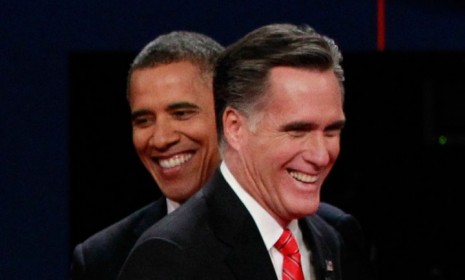The blogosphere is filled with opinions on last night’s debate between the president and the challenger. The chattering classes has gotten a whole lot larger. Unless you are a historian and follow the posts at the History News Network, you probably didn’t see Leo Ribuffo’s reflections. A good friend who teaches history at George Washington University, is writing a biography of Jimmy Carter, and calls himself a McGovern Democrat, Leo is also wittily acerbic. Here is a good example (the rest is here):
Romney obviously won. The question is why. Quite possibly he won because he was channeling his inner Governor George Romney, a moderate Republican in the context of his era. In other words, having secured the Republican nomination, Mitt looked confident and relaxed because he was no longer confined to saying only things he didn’t believe. Perhaps if Romney is elected this inner George would prompt him to restrain the cultural conservatives and limited government zealots who dominate his party. I wouldn’t bet on it, but who knows? Lack of principle made Richard Nixon a better president for the welfare state than anyone expected.
Perhaps Obama lost the debate because he was having an off night. Or because he was over-confident. Or conversely, sensing the precariousness of his situation given the high level or unemployment, he channeled his inner Tom Dewey and decided to sit on his lead in the polls. Or perhaps, channeling his inner Michael Dukakis, he actually thinks a presidential election is about competence, not ideology. But I would speculate further that Obama had trouble mounting an effective and spirited defense of the welfare state because at heart he is a “new kind of Democrat” skeptical of government programs.
Whatever the reasons, Obama was lousy. Some pundits instantly attributed his abysmal performance to his “professorial” demeanor. This dopey short-hand has now become standard, akin to Jimmy Carter the engineer (wrong) and George W. Bush the “faith-based” president (even more wrong). Let’s abandon this cliché. Actual professors by definition hold jobs, which means that we had at least one successful job interview in which we looked people in the eye, explained our merits, and showed enthusiasm about our past work and future plans. Then, after being hired, we figured out how to adapt our complex and sometimes esoteric ideas to reach the audience at hand. As my old friend Warren Goldstein of the University of Hartford emailed me in mid-debate, “Most of us have to be 10 times better than that to keep 20 year olds awake in class.”






8 comments
Siarlys Jenkins
“Total expenditures in 2011 were $736 billion. Total income was $805 billion,
which consisted of $691 billion in non-interest income and $114 billion in
interest earnings. Assets held in special issue U.S. Treasury securities grew
to $2.7 trillion.”
Looking good for the short term. They project running out in 2033, which is plenty of time to adjust. I for one am willing to work until I’m 70 if that means I’m covered after that. Rules already in place tell me I would get twice as much per month as if I retire at 62. That’s how it should be. We cant work less, live longer, and just expect the benefits to be there. Tweak the boundaries, and let people choose from realistic possibilities.
Kevin
“I would speculate further that Obama had trouble mounting an effective and spirited defense of the welfare state because at heart he is a “new kind of Democrat” skeptical of government programs.”
Seriously? I can’t think of anything that could even plausibly count as evidence for that speculation.
Deane
In the debate, Pres. Obama stated “Social Security is structurally sound.” Anyone in his position whose analysis leads him to believe that Social Security is structurally sound is clearly not very skeptical of government programs.
$8.6 trillion in unfunded obligations (up $2.1 trillion in a year) does not seem structurally sound to me.
From Social Security Board of Trustees 2012 Annual Report
The open group unfunded obligation for OASDI over the 75-year period is $8.6 trillion in present value and is $2.1 trillion more than the measured level of a year ago.
http://www.ssa.gov/oact/tr/2012/tr2012.pdf
Deane
“But I would speculate further that Obama had trouble mounting an effective and spirited defense of the welfare state because at heart he is a “new kind of Democrat” skeptical of government programs.”
He definitely does not govern as one skeptical of government programs.
Anymouse
“In other words, not only is Mitt Romney a lying immoral creep, but according to the historian Leo Ribuffo, Romney’s duplicity in the service of vice is what would make him a good president.
Interesting choice of reflections for the Front Porch Republic to single out as worthy of merit.”
It demonstrates the choices we have. We need to work on the prepolitical options we have because there is clearly not much left in politics for conservatives and traditionalists.
Dwight Lindley
Love that last line.
John Haas
Leo’s da man. Good re-post.
love the girls
Interesting choice of reflections on the debate to single out as a juxtaposition to the “chattering classes” And what is the wisdom imparted to us in the reflection? :
“Mitt looked confident and relaxed because he was no longer confined to saying only things he didn’t believe. Perhaps if Romney is elected this inner George would prompt him to restrain the cultural conservatives and limited government zealots who dominate his party. I wouldn’t bet on it, but who knows? Lack of principle made Richard Nixon a better president for the welfare state than anyone expected.”
In other words, not only is Mitt Romney a lying immoral creep, but according to the historian Leo Ribuffo, Romney’s duplicity in the service of vice is what would make him a good president.
Interesting choice of reflections for the Front Porch Republic to single out as worthy of merit.
Comments are closed.